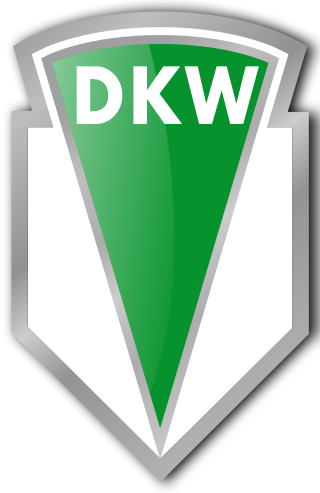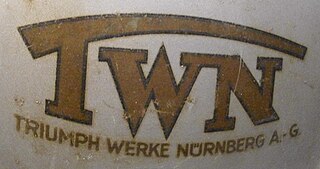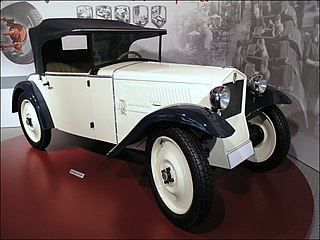This article needs additional citations for verification .(February 2024) |

Fritz Cockerell (1889-1965) was a German pioneer of motorcycle, automotive and engine construction.
This article needs additional citations for verification .(February 2024) |

Fritz Cockerell (1889-1965) was a German pioneer of motorcycle, automotive and engine construction.
Fritz Cockerell (born 25 November 1889 in Munich, died 16 April 1965) was a German pioneer of motorcycle, automotive and engine construction. His real name was Friedrich Gockerell, but in his published patent documents, he is referred to as Fritz Cockerell.
Fritz Cockerell initially worked as a machinist in an airship factory and later in steam turbine construction at Maffei. He then moved to Rapp Motorenwerke, which later became Bayerische Motorenwerke (BMW), where he worked as a test engineer. Later, with Hans Meixner and Otto Landgraf, he founded the Megola works in Munich for the production of the Megola motorcycle. This was characterized by a five-cylinder rotary engine in the front wheel and around 2,000 units were built. [1] The Megola was added to the temporary exhibition "The art of the motorcycle" by the Guggenheim Museum in 1998.
Cockerell operated the Cockerell Fahrzeugwerke [ de ] and developed in-house an eight-cylinder two-stroke engine for a "German people-determined sports car" and a four-cylinder two-stroke engine, which was used for installation in a few prototypes of a car and a two-wheeler. Cockerell was more successful with auxiliary bike engines and light motorcycles, which were considered very reliable and sold under his own name. He later devoted himself to research on diesel engines for aircraft, turbine engines and the Wankel engine.

DKW was a German car- and motorcycle-marque. DKW was one of the four companies that formed Auto Union in 1932 and thus became an ancestor of the modern-day Audi company.

Gottlieb Wilhelm Daimler was a German engineer, industrial designer and industrialist born in Schorndorf, in what is now Germany. He was a pioneer of internal-combustion engines and automobile development. He invented the high-speed liquid petroleum-fueled engine.

Motorenwerke Zschopau GmbH is a German motorcycle manufacturer located in Zschopau, Saxony. The acronym MZ since 1956 stands for Motorenwerke Zschopau GmbH. From 1992 to 1999 the company was called MuZ, an acronym for Motorrad und Zweiradwerk.

The Rover Company Limited was a British car manufacturing company that operated from its base in Solihull in Warwickshire. Its lasting reputation for quality and performance was such that its first postwar model reviewed by Road & Track in 1952 was pronounced finer than any but a Rolls-Royce. Rover also manufactured the Land Rover series from 1948 onwards, which spawned the Range Rover in 1970, and went on to become its most successful and profitable product — with Land Rover eventually becoming a separate company and brand in its own right.

Auto Union AG was an amalgamation of four German automobile manufacturers, founded in 1932 and established in 1936 in Chemnitz, Saxony. It is the immediate predecessor of Audi as it is known today.

The Megola was a German motorcycle produced between 1921 and 1925 in Munich. Like Bimota, the name is a portmanteau derived from the names of its designers Meixner, Gockerell, and Landgraf.

NSU Motorenwerke AG, or NSU, was a German manufacturer of automobiles, motorcycles and pedal cycles, founded in 1873. Acquired by Volkswagen Group in 1969, VW merged NSU with Auto Union, creating Audi NSU Auto Union AG, ultimately Audi. The name NSU originated as an abbreviation of "Neckarsulm", the city where NSU was located.

Zündapp was a major German motorcycle manufacturer founded in 1917 in Nuremberg by Fritz Neumeyer, together with the Friedrich Krupp AG and the machine tool manufacturer Thiel under the name "Zünder- und Apparatebau G.m.b.H." as a producer of detonators. In 1919, as the demand for weapons parts declined after World War I, Neumeyer became the sole proprietor of the company, and two years later he diversified into the construction of motorcycles.

J. A. Prestwich Industries, was a British engineering equipment manufacturing company named after founder John Alfred Prestwich, which was formed in 1951 by the amalgamation of J. A. Prestwich and Company Limited and Pencils Ltd.

A motorcycle engine is an engine that powers a motorcycle. Motorcycle engines are typically two-stroke or four-stroke internal combustion engines, but other engine types, such as Wankels and electric motors, have been used.
Max Friz was a German mechanical engineer specializing in engine design. He was the key contributor of engine design and innovation that led to the founding of Bayerische Motoren Werke AG (BMW) in 1917.

The official founding date of the German motor vehicle manufacturer BMW is 7 March 1916, when an aircraft producer called Bayerische Flugzeugwerke was established. This company was renamed to Bayerische Motoren Werke (BMW) in 1922. However, the BMW name dates back to 1917, when Rapp Motorenwerke changed its name to Bayerische Motoren Werke. BMW's first product was a straight-six aircraft engine called the BMW IIIa. Following the end of World War I, BMW remained in business by producing motorcycle engines, farm equipment, household items and railway brakes.

Ardie was a company in Nürnberg, Germany that manufactured motorcycles from 1919 until 1958. The company's name derives from that of its founder, Arno Dietrich.

Triumph-Werke Nürnberg AG or TWN, was a German bicycle and motorcycle company. In 1886, Siegfried Bettmann founded the Triumph bicycle factory in Coventry, England, and in 1896 he founded a second bicycle factory in his native Nuremberg, Germany, under the same Triumph name. Both factories branched out into making motorcycles: the Coventry factory in 1902 and the Nuremberg factory in 1903.
Internal combustion engines date back to between the 10th and 13th centuries, when the first rocket engines were invented in China. Following the first commercial steam engine in 1698, various efforts were made during the 18th century to develop equivalent internal combustion engines. In 1791, the English inventor John Barber patented a gas turbine. In 1794, Thomas Mead patented a gas engine. Also in 1794, Robert Street patented an internal-combustion engine, which was also the first to use liquid fuel (petroleum) and built an engine around that time. In 1798, John Stevens designed the first American internal combustion engine. In 1807, French engineers Nicéphore and Claude Niépce ran a prototype internal combustion engine, using controlled dust explosions, the Pyréolophore. This engine powered a boat on the river in France. The same year, the Swiss engineer François Isaac de Rivaz built and patented a hydrogen and oxygen-powered internal-combustion engine. Fitted to a crude four-wheeled wagon, François Isaac de Rivaz first drove it 100 metres in 1813, thus making history as the first car-like vehicle known to have been powered by an internal-combustion engine.
Fritz Gosslau was a German engineer, known for his work on the V-1 flying bomb.

The DKW F1 was a small car produced by DKW between 1931 and 1932. It was launched at the Berlin Motor Show in February 1931.
The NSU Sulmobil was a three-wheeled car built by Neckarsulmer Fahrzeugwerke Aktiengesellschaft (NSU) in the years 1905 to 1909.
The Hansa 400 is a microcar made in 1933 to 1934 by Hansa Lloyd and Goliath Company, Borgward & Tecklenborg in Bremen, Germany. After about a year in production, it was replaced by the next model Hansa 500 with a bigger engine.